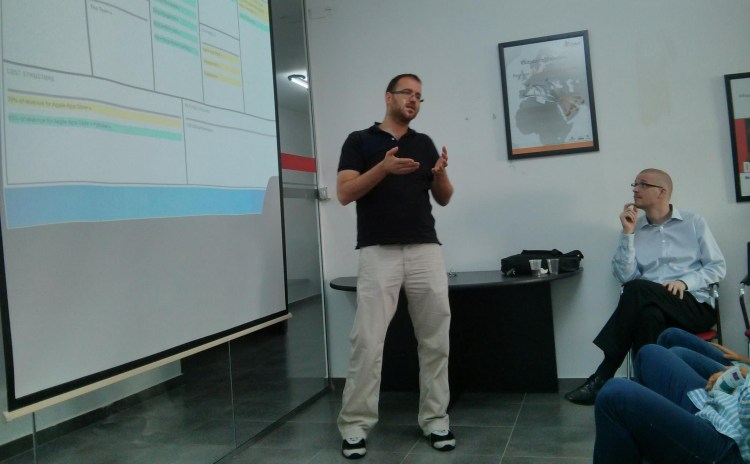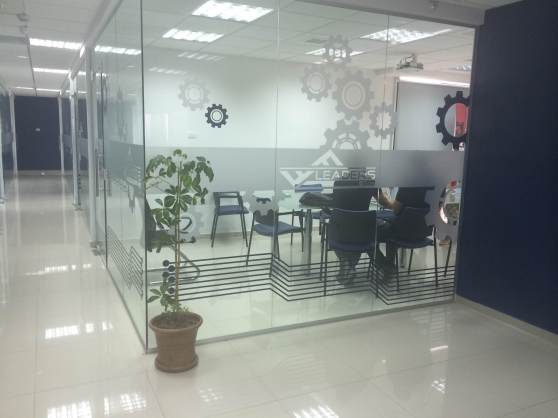Investments improving, long-terms risks remain
Today, Palestine has just one startup accelerator, a few incubators, one early-stage VC, and a few later-stage VCs. But Al Kheir says investors have been warming up to the idea of investing in Palestinian startups in the past few years.
“The reason for their interest is the fact that Palestinian entrepreneurs seem to be very innovative and creative, have access to the Arab and Muslim markets, and have access, to some degree, to the Israeli tech scene to learn from,” he said. “And the reason it’s not huge, is the simple fact that the whole sector is still very young and the risks are high.”
And potential investors are keenly aware of the risks that grow from the legal, social, political “otherness” of Palestine.
“Ramallah is in the West Bank, so you’re dealing with a place that’s controlled by the Palestinian Authority,” says Yoav Leitersdorf, the managing partner at YL Ventures, a VC based in San Francisco and Tel-Aviv that focuses its investments on Israeli tech companies. “It’s just like investing in a different country with a different legal system and regulatory framework.
“And on top of that, there is also the political situation — the state of affairs between Israel and the Palestinian Authority.”
Ramallah, where PinchPoint is based, is seen as a safer place for investments than other more politically troubled places like Gaza. “There are several Israeli and Israel-related funds and other types of investors, including angel investors, that are actively investing in Ramallah-based startups,” Leitersdorf says.
The main reason for this is that the Palestinian Authority in the West Bank has been working to improve relations with Israel in the past few years. “You’ll notice that they [the Palestinian Authority which controls the West Bank] did not materially partake in the current conflict between Israel and Hamas,” Leitersdorf says.
So Israeli and Israel-related investors have been encouraged to look seriously at investments in Ramallah. Leitersdorf believes there are a dozen to two dozen companies there that have received investment from Israeli or Israel-related investors.
“The challenge has been that investors are looking at the long term — a typical investment horizon is one to two decades and investments in Ramallah are dependent upon things remaining quiet between the Palestinian Authority and Israel,” Leitersdorf says. “Unfortunately, it is possible that there could be more conflict in the future. Certainty a third Palestinian uprising could completely wipe out the value of such an investment.”
Searching for talent, money, and knowledge
Not all of PinchPoint’s problems arise from the political situation. “Many of the challenges we face are the same everywhere else in the world,” PinchPoint’s Al Kheir said. “We are always on the hunt for the next investment and we are always short on talent.”
But Al Kheir says artwork designers are particularly hard to find in Palestine, and finding talented game developers has been even more difficult.
“The biggest challenge for PinchPoint has been to find talented designers who can create concepts, game levels, and come up with monetization ideas — there are none in Palestine,” he says. “So we hired a Canadian game designer as a consultant who handles the game design and will train Palestinian game designers.”
PinchPoint didn’t rely on venture capital starting out, but rather got funding from international aid agencies like USAid and the Canadian Aid program. Those groups, Al Kheir says, were initially focused on building a better outsourcing sector in Palestine, but the plans didn’t work out.
So the agencies started thinking about other parts of the IT sector, and the next obvious option was entrepreneurs and startups. “So they started with training programs and workshops, then they started giving grants to entrepreneurs to start new companies,” Al Kheir says. “This paved the way for venture capital firms — which are not that many by the way.”
Later on, in order to access venture capital, PinchPoint had to register the company as headquartered in Delaware USA and list the Ramallah office as a “Palestine branch.” Al Kheir says Palestinian law is currently not investor-friendly, but that a new law is now being introduced to correct the situation.
Despite all of these problems, the tone of the emails that came in from Al Kheir didn’t sound distressed or unhappy. The CEO’s excitement about his company and games in general seemed to radiate from his words.
Whether PinchPoint will be able to continue making games and perhaps expand their business depends a lot on the fate of the West Bank, and it’s tenuous relationship with Israel.
The truth is, you’ll find a wide spectrum of beliefs among Israelis about the Palestinians. Israelis on the left are almost militant in their belief that Israel should recognize, respect and cooperate with Palestinians. But others on the far right don’t even recognize the Palestinians’ right to exist, and will have nothing to do with them.
When political power is concentrated on the right side of the spectrum, as it is now, investment in Palestinian companies becomes more risky.
If Palestine becomes more and more locked down by the Israeli presence, it may become harder for the region’s tech startups to survive.
VentureBeat's mission is to be a digital town square for technical decision-makers to gain knowledge about transformative enterprise technology and transact. Learn More



